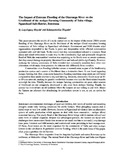| dc.contributor.author | Magole, L. | |
| dc.contributor.author | Thapelo, K. | |
| dc.date.accessioned | 2011-12-02T11:49:31Z | |
| dc.date.available | 2011-12-02T11:49:31Z | |
| dc.date.issued | 2005 | |
| dc.identifier.citation | Magole, L. & Thapelo, K. (2005) The impact of extreme flooding of the okavango river on the livelihood of the molapo farming community of Tubu village, Ngamiland, Botswana, Botswana Notes and records, Vol. 37, pp. 125-137 | en_US |
| dc.identifier.uri | http://hdl.handle.net/10311/949 | |
| dc.description.abstract | This paper presents the results of a study carried out on the impact of the recent (2004) severe flooding of the Okavango River on the livelihood of the molapo (flood recession) farming community of Tubu village in Ngamiland sub-district. Government and NGO disaster relief
organisations responded to the floods in panic and desperation while affected communities
appeared calm and laid-back. To the extent that they (communities) refused to evacuate flood plains and island settlements to make way for the considerably high and potentially dangerous flood of 2004; the communities' reaction was surprising as the floods were so severe upstream,
that they caused damage to property, threatened lives and reduced yields significantly. However, studying the farming community of Tubu revealed that community members have other considerations
which make them perceive the inherent risk differently from outsiders.
Communities view flooding (whether severe or normal) more as part of the biodiversity
production system and a source of livelihood than a destructive force. It was found regarding
molapo farming that, first, even under hazardous flooding conditions crop yields are still better
compared to those under alternative dryland farming. Secondly, destructive floods occur at 10-
to 20-year intervals, making the gamble worthwhile because over time the flood-related benefits
outweigh the risks. Thirdly, because the molapo farming communities are poor, other sources
of livelihood are not adequately developed to take over from molapo farming. Fourth, the
system has evolved into an old tradition which the farmers are not willing to part with. Hence the farmers are adamant that abandoning the production system is not, as yet, an option for them. | en_US |
| dc.language.iso | en | en_US |
| dc.publisher | Botswana Society | en_US |
| dc.subject | severe flooding | en_US |
| dc.subject | molapo farming | en_US |
| dc.subject | Okavango delta | en_US |
| dc.subject | Tubu village | en_US |
| dc.title | The impact of extreme flooding of the okavango river on the livelihood of the molapo farming community of Tubu village, Ngamiland Sub-district, Botswana | en_US |
| dc.type | Published Article | en_US |
| dc.link | http://www.jstor.org/stable/10.2307/40980409 | en_US |

